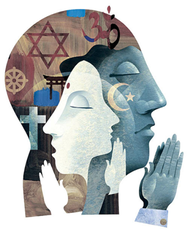
But some interfaith practitioners have found such wisdom and truth in another faith that they feel they can commit to both. A few years ago Paul Knitter wrote a book ' Without the Buddha I couldn't be a Christian' in which he explained how Buddhist teaching helped him make sense of some Christian doctrines to the extent that he took refuge in the Buddha, the Dharma and the Sangha - the declaration that normally makes someone Buddhist. He can happily live a commitment to both faiths and finds that one helps him make sense of the other. And he's not the only one.
It's become such a phenomenon that the World Council of Churches has had consultations on it, theologians and students of religion have debated it. Some believe it's possible while others are more sceptical. Purists of course don't like it thinking that it can lead to a pick and mix kind of religion. And it is possible today to be ordained as an interfaith minister which allows people to conduct services with readings and prayers from a variety of religions. At one level it's as though interfaith has become a religious movement in its own right and one of the reasons why interfaith practitioners often want to talk about inter faith as two words to show it is a movement which brings two or more faiths together.
The dual belonging that is the focus of interest and debate among scholars is not pick and mix but an appreciation of the integrity of each religion to the extent that someone feels at home in both. But even in ordinary interfaith relations, when someone identifies with only one tradition a mutuality occurs, at least it has for me. Something like holy envy can occur in realising the strength in another religion's practice that you might like to see in your own. Someone else's belief can help recapture forgotten traditions in your own. Buddhism has helped many Christians rediscover Christianity's meditative and mystical tradition. The focus on mindfulness has reminded many of Christianity's belief in the sacrament of the present moment. And Christianity has encouraged a new sense of engaged Buddhism. And it can happen with other religions too.
The reason I've been reflecting on this is I've recently seen the DVD of 'The Life of Pi'. I've always loved the incident in the book (not shown to the same extent in the film) in which Pi and his parents encounter three holy men from three religious tradions - Hinduism, Islam and Christianity all of whom claim him as their own as he's been visiting each of them and learning about their faith. While the three are happy to see someone so keen on God they all agree that " he can’t be a Hindu, A Christian and a Muslim. It’s impossible. He must choose” Pi's reply was “Bapu Gandhi said ‘All religions are true’ I just want to love God” And it seemed to do the trick as we're told "The three wise men pulled away with stiff, grudging smiles on their faces". Hard to disagree with that!


 RSS Feed
RSS Feed
